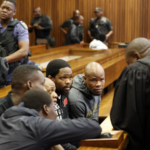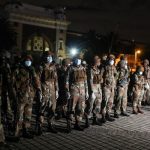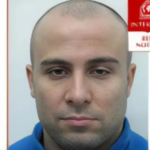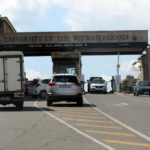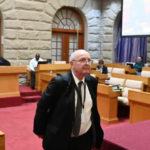JOHANNESBURG – What began as a seemingly straightforward security incident involving Deputy President Paul Mashatile has rapidly spiralled into a vortex of political intrigue, accusations of fabrication, and a stark illustration of the intense power struggles gripping the African National Congress (ANC).
The reported assassination attempt on Mashatile has not only been met with scepticism but has also unveiled the deep-seated divisions within the ruling party, exposing the complex web of alliances and rivalries that are shaping the future of South African politics.
Adding to the air of mystery surrounding the event, Mashatile himself has downplayed the severity of the incident, initially dismissing the sound of gunfire as mere stones hitting the vehicle. "What happened is that as I was driving from the NEC, my car was hit by what initially I thought were stones," he explained during a visit to the KwaSizabantu Mission in KwaZulu-Natal. "When we got home, the protectors said the impact was too much, and they wanted to take it for checking because you know a bulletproof windscreen is too strong to be damaged."
In a bid to reassure the public, Mashatile emphasised the robust nature of his vehicle's bulletproof windscreen and the effectiveness of his security detail, stating, "The bulletproof windscreen is quite strong to be damaged. I’m properly protected so [there’s] nothing to worry about."
However, the seemingly nonchalant response from the Deputy President has done little to quell the growing chorus of scepticism and suspicion surrounding the alleged assassination attempt. In fact, it has only served to fuel the perception that there is more to this story than meets the eye.
Dennis Bloem, spokesperson for the Activists and Citizens Forum, minced no words in his condemnation of the alleged assassination attempt, stating unequivocally, "If it was the truth, the country could have been turned upside down by the security forces and by the ANC itself. The ANC could’ve made a big noise but up until now, they are quiet. That’s why we are saying this is a cooked-up story."
The forum has further pointed to the ANC's apparent lack of a unified response to the incident, highlighting reports that Secretary-General Fikile Mbalula had not received a detailed report from Mashatile's office regarding the alleged attack. This apparent lack of coordination and communication within the highest echelons of the ruling party has only served to reinforce the perception that something is amiss.
While ANC Treasurer-General Gwen Ramokgopa has refuted claims linking the incident to the 2027 Conference and has called for a thorough investigation by law enforcement, her comments have done little to dispel the growing sense of unease and suspicion surrounding the alleged assassination attempt.
The political reaction to the claim has been particularly revealing, offering a glimpse into the complex dynamics at play within the ANC. Zamani Saul, the ANC's provincial leader in the Northern Cape, appeared to express outright disbelief when questioned about the alleged assassination attempt.
In the nuanced language of ANC politics, Saul's statement is a clear and unmistakable condemnation. He is not only suggesting that the claim is patently absurd but also implying that it is a deliberate attempt to manipulate public opinion and garner political support.
Adding to the chorus of scepticism, Ramokgopa echoed Saul's sentiments, telling journalists that, "Usually when there are these reports, and all that, many of them are fake, actually."
The fact that senior ANC leaders are openly questioning the veracity of the alleged assassination attempt speaks volumes about the level of trust and unity within the ruling party. It also highlights the deep-seated factionalism and power struggles that are threatening to tear the ANC apart.
Interestingly, the South African Communist Party (SACP), a key ally of the ANC, has reacted in stark contrast to the scepticism expressed by Saul and Ramokgopa. The SACP issued a statement condemning the alleged shooting as "a direct attack on the democratic institutions of our Republic," a move that underscores the growing divergence between the two organisations.
The timing of the incident, and the manner in which it was subsequently revealed to the public, has also raised a number of red flags. The fact that the news emerged several weeks after the alleged attack, on the Sunday of an Easter weekend when news cycles are typically slow, has fuelled suspicions that the incident was either not as serious as initially claimed or that someone believed it would be strategically advantageous to keep it quiet until now.
The controversy surrounding the alleged assassination attempt comes at a particularly sensitive time for Mashatile, who has been facing increasing political headwinds in recent months. He recently publicly criticised the Democratic Alliance (DA), a key partner in the country's coalition government, stating that he "would be ashamed" to be a DA minister who voted against the adoption of the fiscal framework while remaining in Cabinet.
This thinly veiled attack on the DA was widely interpreted as a signal that Mashatile was seeking to remove the DA from the coalition and replace it with a more amenable partner, such as the Economic Freedom Fighters (EFF) or the uMkhonto weSizwe (MK) party.
It is no secret that Mashatile would be more comfortable in a coalition involving the EFF or MK, both of which share his populist leanings and his scepticism towards the DA's pro-market policies. However, the ANC's top leadership appears to have decided to continue working with the DA, at least for the time being, potentially leaving Mashatile feeling increasingly isolated within the party's inner circle.
The alleged assassination attempt also shines a spotlight on the increasingly fraught succession battle within the ANC. With President Cyril Ramaphosa's term drawing to a close, the race to succeed him is heating up, and Mashatile is widely seen as one of the leading contenders for the top job.
However, the path to the presidency is fraught with peril, and Mashatile faces a number of significant obstacles, including his perceived lack of support within the Ramaphosa faction of the ANC and his reputation for being a political opportunist.
The ANC, now a shadow of its former self, appears to be a fragmented collection of competing factions that only coalesce around certain issues. This makes campaigning and organising ahead of a party conference exceedingly difficult, as alliances shift and loyalties are tested.
While Mashatile is clearly in campaign mode, no one seems to be seriously challenging him at this point, suggesting that the succession battle is still in its early stages.
Ultimately, the truth behind the alleged assassination attempt on Paul Mashatile may never be fully revealed. The incident has exposed the deep-seated divisions within the ANC, the complex political manoeuvring surrounding the succession battle, and the increasingly fraught relationship between the ruling party and its coalition partners.

Follow Us on Twitter


